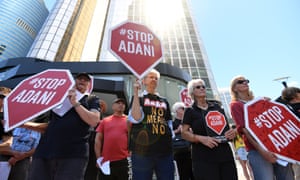Judgment details how ‘payment difficulties’ emerged in contract between AECOM and Adani subsidiary
Adani has been ordered to pay almost $12m owed to engineering firm AECOM for work on a scrapped rail line to the Carmichael coalmine.
A judgment in the Queensland Building and Construction commission details how “payment difficulties” emerged in a contract between AECOM and an Adani subsidiary company. The 1,862-point commission adjudication says Adani had “anticipated” receiving government support that did not materialise, including a $1b federal loan to build the rail link between Carmichael and the Abbot Point port.
The loan was vetoed by the Queensland government in November last year. The contract to design the rail line was suspended about six months later.
Soon after AECOM lodged a claim with the QBCC alleging it was owed $20m for the work. Adani countered by offering $325,000.
The QBCC this week issued a detailed mixed ruling that Adani owes
AECOM about $12m, plus interest. The ruling also reveals how the rail
line, which has since been abandoned, suffered a series of setbacks.A judgment in the Queensland Building and Construction commission details how “payment difficulties” emerged in a contract between AECOM and an Adani subsidiary company. The 1,862-point commission adjudication says Adani had “anticipated” receiving government support that did not materialise, including a $1b federal loan to build the rail link between Carmichael and the Abbot Point port.
The loan was vetoed by the Queensland government in November last year. The contract to design the rail line was suspended about six months later.
Soon after AECOM lodged a claim with the QBCC alleging it was owed $20m for the work. Adani countered by offering $325,000.
“[AECOM] argued that these difficulties resulted in delays ... [and] a substantial change to [Adani’s] project delivery strategy, resulting in the suspension of the claimant’s services,” adjudicator Chris Lenz said.
Adani had previously said the Naif loan was “not critical” to its project. As the rail project struck “difficulties”, Adani was unsuccessfully attempting to find outside finance for the Carmichael project. Eventually the company changed tack, downscaling port, rail and mine plans and cutting costs to an extent it can self-finance Carmichael.
It announced last month Carmichael would go ahead without external finance, and that works at the site in the Galilee Basin are imminent. But several key approvals and processes remain outstanding; including some which will not be finalised by the federal election. Adani has sought to frame those approvals as formalities, and can undertake some works before those approvals being granted.
What does Adani's latest mine plan mean? – video explainer
Guardian Australia has previously reported that access discussions with rail network operator Aurizon will likely take until September, and that those negotiations will need to settle who pays for line upgrades worth at least $100m.
Management plans for groundwater have not been approved. A recent government report said cumulative water impacts in the Galilee had been understated, and the ABC reported this week the CSIRO had flagged concerns about Adani’s groundwater dependent ecosystems management plan, which the Queensland government must approve, and for which there is no statutory timeframe.
No significant ground disturbance can occur until the groundwater plan is approved.
Adani said in a statement it had invested $3.3bn in its Australian businesses, “a clear demonstration of our capacity to deliver a financing solution for the mine and rail project, as well as meeting all financial obligations”.
“In September we announced a new narrow-gauge railway design solution for the Carmichael project to accelerate the delivery and reduce capital costs. We have already secured the necessary approvals and land-access agreements with landholders needed to build the line.
“We are working through [the] regulatory process with the network owner and once it is complete we will commence construction of the rail line.”

No comments:
Post a Comment